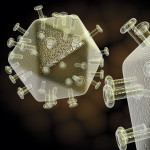Researchers have found several new HIV mutations that decrease the effectiveness of Prezista (darunavir) and two that actually increase its effectiveness, according to a study published online January 15 in the Journal of Antimicrobial Chemotherapy.
It is not uncommon for researchers to continue identifying new drug resistance mutations that impact the effectiveness of a drug after it has been approved. This is why studies to identify these mutations, particularly in real world settings, are so vital.
To determine the viral mutations that affected Prezista’s ability to suppress HIV, Diane Descamps, MD, from the Bichat Claude Bernard Hospital in Paris, and her colleagues analyzed blood samples from 153 treatment-experienced HIV-positive patients who started a new regimen including Prezista.
Descamps and her team found eight mutations that people had developed while on other protease inhibitors that ultimately decreased Prezista’s ability to keep virus suppressed. Four of these mutations had been previously identified: I47V, I54M, T74P and I84V in the protease gene. Four mutations were new: K14R, K20I, E34Q and K55R.
Descamps’s team also found two mutations that appeared to increase the effectiveness of Prezista: E35D and V82A in the protease gene. The authors write that this may help explain why Prezista is so potent in people who have developed resistance to other protease inhibitors.
Advertisement
Advertisement
Advertisement






1 Comment
1 Comment